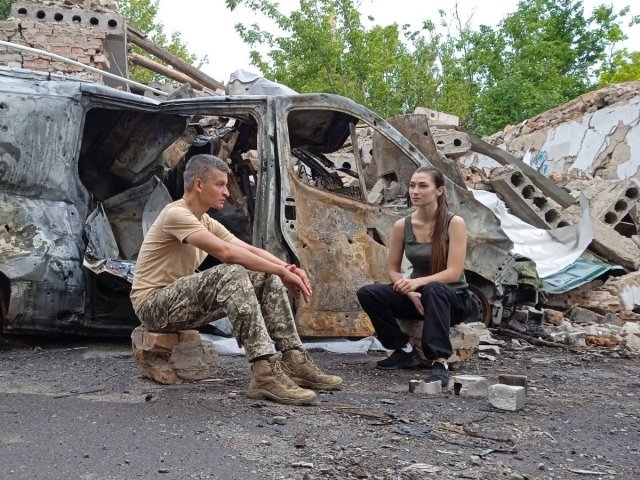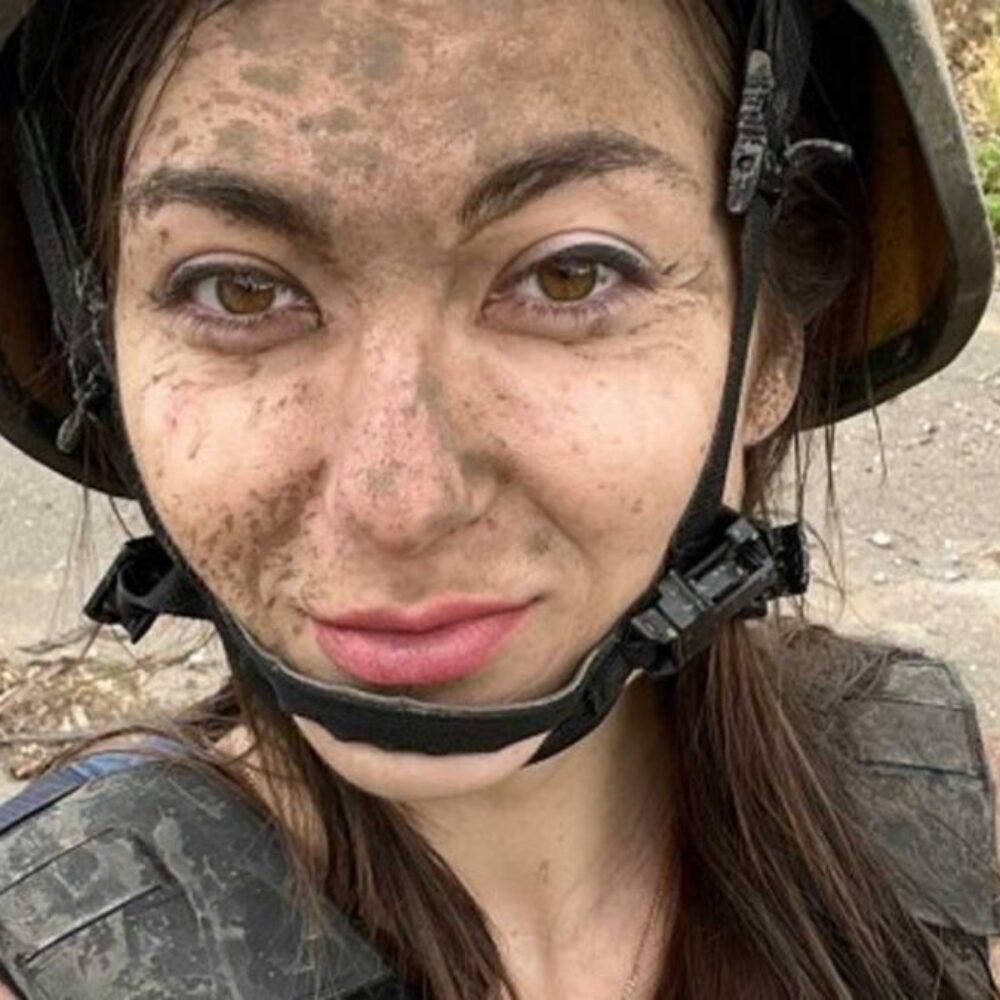This investigation is part of the Justice for Journalists Foundation Investigative Grant Programme and was initially published by inews.co.uk).
i met with the country’s female war journalists in Ukraine, where they discussed the reality of covering the deaths of friends and neighbours.
On 27 June, Iryna Sampan was sitting in a Kramatorsk restaurant popular with journalists and locals after filming on the front line.
She had planned to stay at Ria Pizzeria for as long as it took to upload her video files. But the internet was unusually slow, and after two hours, she decided to move the operation to a friend’s flat.
At 6.50pm, she packed up her laptop and left. About half an hour later, a Russian rocket landed on the restaurant, killing 12 people, including Ukrainian writer Victoria Amelina.
“I have so much trauma,” Ms Sampan, 29 and based in Kyiv, tells i. “I hear a loud noise, I think it is a bomb.
“Yesterday, the strangest thing happened. A bottle of beer I was buying exploded in the cashier’s hand. I dropped down, my hands over my head.”
Tall, fearless and radiating with self-assurance, she has been reporting from the front line since 2014, when she was just 19 years old.
What gets her through is the strong relationships she has built with the soldiers she films. “They are my legion, my team,” she says.

Ria Pizzeria was a sanctuary for reporters as they returned from the front, including Ms Sampan, Ms Amelina and Ukrainska Pravda’s Olga Kyrylenko, who was 900 metres away from where the Russian rocket landed.
“When the full-scale invasion started it was the worst thing to have ever happened in my life,” Ms Kyrylenko, 25, tells i. “I first went to the front in May 2022.”
The scenes that greeted her were the stuff of nightmares: a basement shelter crammed with more than 100 families living in darkness, with no running water, no sanitation, and Covid-19 ripping through the population. “Everyone was sick, it was awful,” she adds.
Despite – or perhaps because of – her youth and small stature, the soldiers took Ms Kyrylenko under their wing.
“I reminded them of their daughters,” she says, smiling. “One soldier asked if he could smell my hair, as the smell of conditioner reminded him of home. I wanted him to have normal life for a second.”
She does not know if he is still alive. “Sometimes the heroes we film are dead by the time we publish,” she says.
Ms Kyrylenko initially believed that the best way to cope with the violence and brutality of war was to shut down.
“I need to stay cool to do my job,” she says. Now, she allows herself to cry. She was recently filming in a cemetery where a Ukrainian soldier was being buried. “I didn’t realise I was crying but tears were running down my face.”
Kyiv-based reporter Nadiia Burbela, 29, has been on a similar journey since recognising the need to feel her pain and trauma. The bright-eyed economics journalist took on the role of reporting and recording war crimes for media outlet Unian’s social media.
Being confronted daily with images of dead bodies and stories of rape, torture and death took its toll.
“I started by thinking alcohol was the answer to the trauma I felt,” Ms Burbela told i. “I was having nightmares about ripped-up bodies and screaming people. My relationships with my loved ones were suffering. I cried all the time – I had changed.”
After Unian arranged for a psychologist to meet its management, Ms Burbela sought help, and was eventually prescribed anti-depressants. “Now there is colour in my life,” she says.
Stigma around mental health remains strong in Ukraine even as journalists, military personnel and citizens across the country are struggling with trauma.
Visti News’ Anna Chernenko was reporting live from the city of Kharkiv, about 20 miles from the Russian border, when it suffered heavy bombardment from the start of the invasion.
Twenty-four civilians were killed as the historic centre was attacked on 1 March last year, including a child, according to data from the charity Action on Armed Violence.
“Before 24 February, 2022, as journalists we were observers,” Ms Chernenko added, her bullet-proof vest and helmet on the chair in her office. “Now we are making news about our neighbours, our family, our friends.”
Soon after, Russian weapons hit closer to home when a cluster bomb exploded outside her office on the city’s outskirts on 15 April, 2022, killing 10 civilians, including a child. Pointing at a still-shattered window, she said: “I don’t think I will ever replace it. It’s a reminder of what happened here.”
It’s a sentiment shared by Oleksandra Novosel, regional reporter for the public broadcaster Suspilne, which had to close its Kharkiv office when the neighbouring building was destroyed.
Evidence of Russian artillery is still visible on every street – from the shelled McDonald’s to the smashed and pockmarked façade of the administrative building.
Ms Novosel is determined to show that in Kharkiv “there is life despite the war”, but it is not easy. “We are tired all the time. Not because we are journalists, but because we are Ukrainian.”
Her parents’ house was occupied by Russian forces before the Kharkiv region was liberated. “It’s hard, it was my home,” she tells i. Her parents are now living in a region controlled by Ukraine.
Freelance journalist Kristina Berdynskykh, who recently returned to her hometown of Kherson to report on the bombing of the Nova Kakhovka dam, adds: “It is like they are shelling our childhoods.”
“Russia has taken the places we used to be happy. Who now remembers that Bakhmut was the city of roses?” she said.
ICTV’s Helen Zorina, who grew up in the cut-off occupied territories, agrees. “The place I lived is closed off to me now.”
Ms Amelina’s memorial took place in Kyiv on 4 July – her friend and colleague Evgeniya Podobna was there. Like Ms Amelina, she has spent much of the conflict investigating war crimes, including in Bucha where the testimonies were so devastating, she cried and vomited after an interview.
“But I am so proud to be part of this great nation of brave people,” she says, tears in her eyes.
All the female reporters i spoke to have that same pride, and a conviction that in the face of Russian disinformation, their work has a purpose. They have stayed in Ukraine to tell the truth of this war, so no-one can ignore what is happening. That purpose drove Ms Amelina, too, say those who knew her.
Sitting in Kyiv’s Victory Park on the left bank of the Dnipro River, in the shadow of the pyramid-shaped monument to the Second World War’s fallen soldiers, Ms Podobna explained how she and Ms Amelina would send one another their work, “just in case”.
On 27 June, the “just in case” scenario took place. By 1 July, Ms Amelina was dead.

